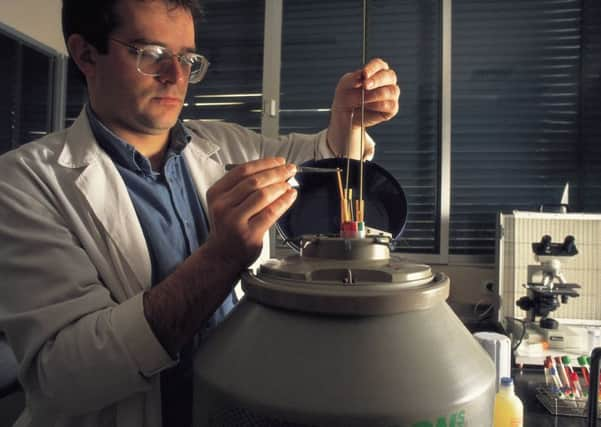Calls to freeze all men’s sperm at age of 18


Scottish scientist Dr Kevin Smith proposed the initiative in light of emerging evidence that paternal age is strongly linked to an increased incidence of neuropsychiatric disorders such as autism and schizophrenia, as sperm becomes more prone to mutations with age.
Writing in the Journal of Medical Ethics, Dr Smith, a bioethicist at Abertay University, Dundee, said NHS sperm-banking “offers a straightforward solution” to the trend of couples having children much later.
Advertisement
Hide AdAdvertisement
Hide AdFreezing eggs from women planning families when they are older is not unusual but the proposals have been met with criticism from experts such as the British Fertility Council, who said it would create “a very artificial approach” to having a baby.
Dr Smith said: “In principle, it would be straightforward for young men – aged perhaps 18 – to elect to have their sperm stored until starting a family at an older age, thus avoiding a build-up of new mutations.
“Sperm banking offers a straightforward solution to the problem of paternal age effect genetic disease.”
Dr Smith, of the university’s school of science, engineering and technology, said the technology for storing sperm was “well-established” and the “widespread adoption” of all young men would be “desirable”.
“This approach may appear radical or intuitively unwelcome to some, in that it would entail a wholesale move away from natural conception,” he added.
“Sperm banking is a practical solution that could in principle be implemented immediately.
“It would provide an ethically unproblematic way for individuals to opt for deferred fatherhood.”
The UK’s first professor of andrology – the study of men’s reproductive health – Prof Allan Pacey said the suggestion was not viable as sperm from the majority of men do not freeze well.
Advertisement
Hide AdAdvertisement
Hide AdThe Sheffield University academic said: “This is one of the most ridiculous suggestions I have heard in a long time.
“Whilst I am aware of the evidence that has linked the risk of some genetic disorders to the age of the father, my understanding is the risks are really quite small and only become detectable once fathers get above about the age of 45 years old.
“It’s for this reason that the UK Professional Bodies have advised that sperm donors should ideally be below the age of 40, although some have argued that this decision is too cautious.
“Having said that, the idea that mass sperm banking for 18-years-olds should be funded by the NHS is simply crackers in my opinion.”
Many men who froze their sperm at 18, and returned to use it later in life, would essentially be asking their wives to undergo one or more IVF procedures in order to start a family, he argued.
Prof Pacey said: “Finally, we already have trouble in some areas in getting adequate NHS funding for many cancer patients who need to bank sperm before chemotherapy and we know the provision of NHS funded IVF treatment across the country for infertile couples is way below what is recommended by the NICE 2013 guidelines. So I would say if there is any spare money around, we should be focussing it on those with a genuine infertility need, rather for some mass sperm-collection initiative where we know the vast majority of men won’t need it or use it.”
The decision could create a further financial burden on the NHS, as it can cost up to £300 a year to store a sample of sperm privately, said Stephen Harbottle, chair of the Association of Clinical Embryologists.
He said: “The suggestion that all men store sperm at 18 is not based upon any compelling scientific evidence and would only result in a further unnecessary financial burden on the NHS.
Advertisement
Hide AdAdvertisement
Hide Ad“Most men will father a child naturally and never return to claim their stored sperm. This would result in cryostorage facilities looking after vast quantities of unclaimed sperm akin to a left luggage store at the expense of the NHS.
“Our message is clear. People should consider starting a family earlier in life where possible, in their 20s and early 30s, to minimise age-related risks.”
Prof Adam Balen, chair of the British Fertility Society, echoed calls for better education for young people on the implications of starting a family late.
He added: “Such a move would provide a very artificial approach to having babies.
“Procreation shouldn’t be taken out of the bedroom and into the test-tube unless there are defined fertility problems.”
Susan Seenan, chief executive of leading charity the Infertility Network UK, said the idea was an extreme solution to a situation which posed a small risk.
She said: “It would also create a very artificial scenario where couples are pushed towards potentially unnecessary reproductive techniques to have a child.
“There is no guarantee that frozen sperm will be effective when defrosted years later; it is known that the sperm from the majority of men does not freeze very well.”